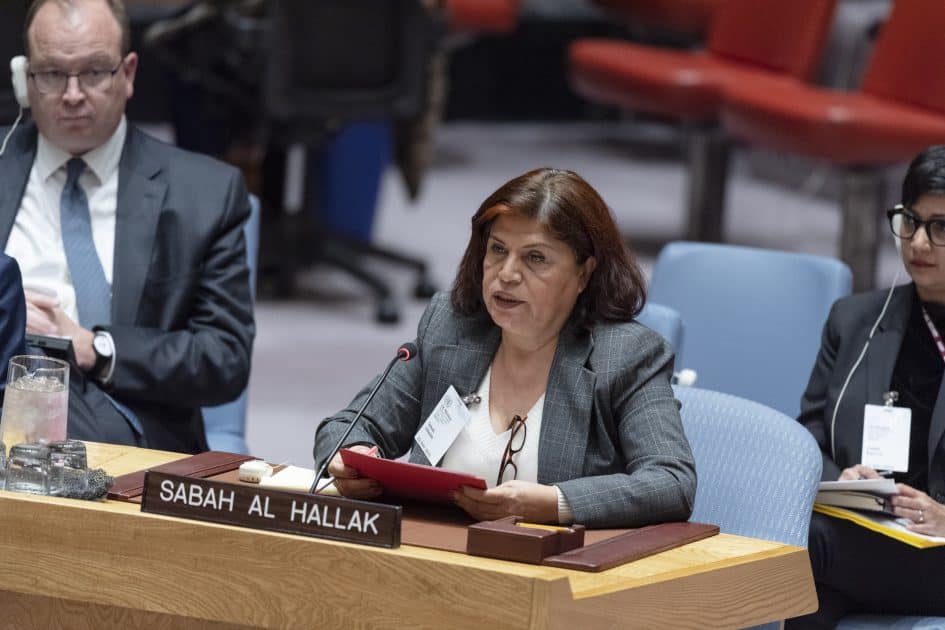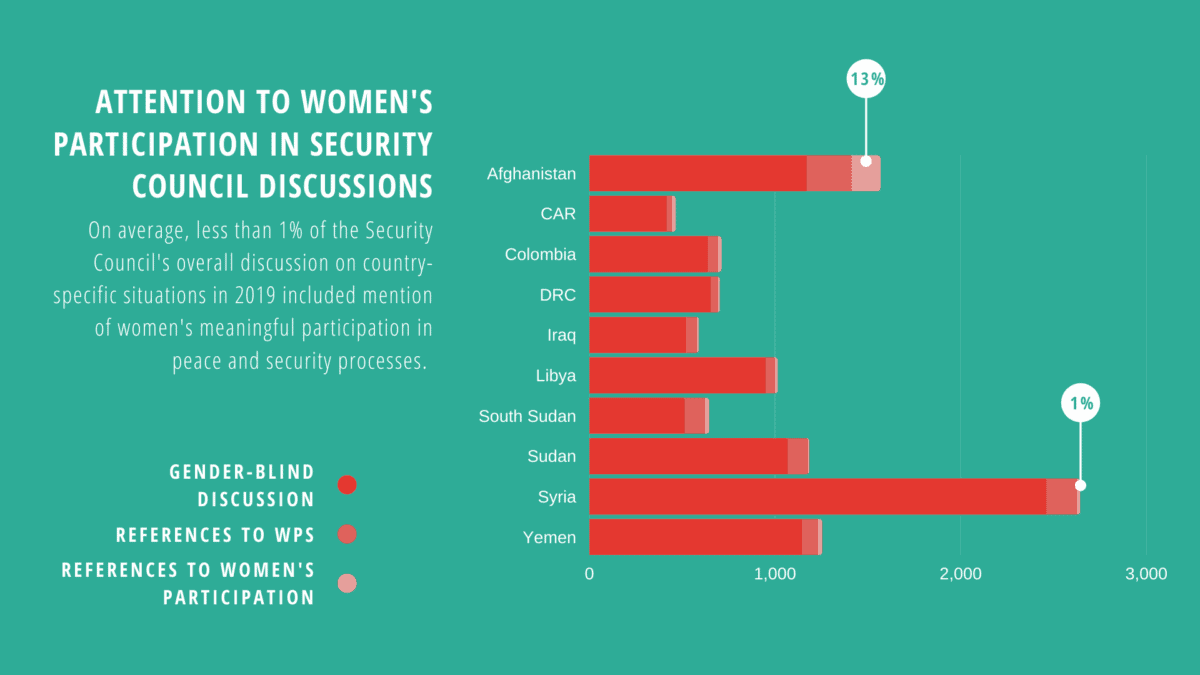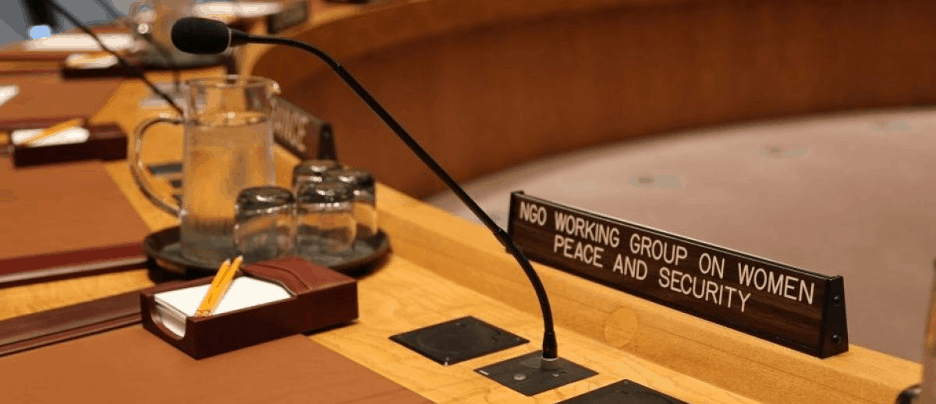Women’s full, equal and meaningful participation in all aspects of peace and security
“Madam President, let me be clear: there can be no democracy in Syria without women’s full, equal and meaningful participation or without codifying women’s rights and gender equality in any political process. Yet, these fundamental issues continue to be overlooked in formal, high-level processes to this day.”
Sabah Alhallak, UN Security Council Briefing on Syria, November 2019

Key Messages
The exclusion of diverse women[1] from peace processes is unacceptable and results in peace agreements that do not reflect their rights, expertise, experiences or needs. Overwhelming empirical evidence confirms that inclusive peace processes are more durable, and that the participation of civil society, including women’s organizations, makes a peace agreement 64% less likely to fail.[2] When women have a meaningful influence over the process, their participation has a positive impact on peace, security and the durability of peace agreements.[3] The exclusion of women, therefore, undermines peace. This means that (1) women must be included in all stages of all peace and security processes, and (2) women’s rights and gender provisions must be a collective responsibility of all actors.
Full, equal and meaningful participation means direct, substantive, and formal inclusion of diverse women in positions of power so that they can influence the outcome of negotiations and other processes as well as their implementation. Consultation without the opportunity to influence the outcome of discussions is not meaningful; it must, therefore, include being able to set and shape agendas as well as experience tangible benefits from engagement.[4] Full, equal and meaningful participation must also be systematic, timely and transparent, and not limited only to peace negotiations, but inclusive of monitoring of agreements, political processes, constitution-building, economic development, transitional justice and reconstruction, as well as disarmament, demobilization and reintegration (DDR) and security sector reform (SSR). While informal, advisory, ad hoc or other means of inclusion besides formal inclusion can be useful, they are not, and must never be presented as, a substitute for direct, formal participation of women in leadership roles and decision-making structures and processes.
The meaningful participation of diverse women in all stages of all processes cannot be negotiated in each context or left to the efforts of individual actors; it must be a system-wide, fundamental component of all operations, and a clear directive to all UN agencies. This should be prioritized, resourced and institutionalized, including by providing relevant financial and political support, with clear procedures to ensure accountability and transparency when processes exclude women. We urge the UN, Security Council and Member States to support peace processes that include the meaningful participation of diverse women and to call out any processes that fail to do so.
Facts

What is the status of women’s meaningful participation in peace processes?
- Formal peace processes have systematically failed to include women. Between 1992 and 2018, women only made up 3% of mediators, 4% of signatories and 13% of negotiators in major peace processes.[5] Further, only two women in history have ever served as chief negotiators: Miriam Coronel Ferrer of the Philippines and Tzipi Livni of Israel; only Coronel Ferrer has ever signed a final peace accord as chief negotiator.[6]
- Women’s participation in informal peace processes is considerably higher; 71% of informal peace processes surveyed in a recent study show “clear evidence of involvement” from women’s groups.[7] Participation in informal processes, however, is not a substitute for formal participation.
- Connecting the tracks within peace processes, and also ensuring women’s full, equal and meaningful participation in formal roles with influence and authority, is critical to ensuring inclusive processes are the starting point for a country emerging from conflict; failing to do so replicates exclusion and discrimination that contribute to conflict and violence.[8]
Recommendations
- Make direct participation of diverse women a requirement in all UN-led or co-led peace processes, and actively advocate for and support the leadership of diverse women from local communities in line with State obligations to ensure women’s full, equal and meaningful representation in all stages of peace processes. These obligations are expressed in the Convention on the Elimination of All Forms of Discrimination Against Women (CEDAW) and CEDAW General recommendation No. 30 on women in conflict prevention, conflict and post-conflict situations, and emphasized in Resolutions 1325 (2000), 1820 (2008), 1889 (2009), 2106 (2013), 2122 (2013), 2242 (2015), 2467 (2019), and 2493 (2019).[9] All peace processes must include full, equal and meaningful participation of diverse women and fully integrate a gender perspective. Where delegations exclude women, UN mediation teams, Special Envoys and Special Representatives should insist on women’s direct participation and take specific steps to facilitate and ensure their participation in a way that gives them the opportunity to influence the outcome of any given process. Symbolic, superficial, advisory, last-minute, informal or ad hoc representation through advisory boards or other observer status must never be presented as substitutes for direct participation. Explicit language on the need to include diverse women in all stages of peace processes must be included in all senior compacts, terms of reference and directives to all senior UN leadership. In addition, UN mediation teams, Special Envoys and Special Representatives must regularly consult with women’s civil society, as called for in Resolution 2122 (2013) and outlined in the Department of Peace Operations’ Gender Responsive United Nations Peacekeeping Operations Policy and the Department of Political and Peacebuilding Affairs’ Women, Peace and Security Policy.
- Take concrete steps to ensure that women do not face retaliation for their participation. Prevent and respond to women who face reprisals for participating in peace and political processes, including elections, at all levels. Ensure that all planning and decision-making is gender-sensitive and takes into account measures to mitigate such risks.
- Regularly review UN-led or co-led peace processes, and make the results publicly available, in order to assess the inclusivity of such processes, boost accountability of UN staff and leadership for promoting women’s meaningful participation, and identify concrete ways to support participation and avoid exclusion in the future.
- Actively support women’s full, equal and meaningful participation and refrain from supporting new peace processes that exclude women. Include explicit language calling for the full, equal and meaningful participation of diverse women in all thematic, country- and region-specific outcome documents, mandates of peace operations, and in any public statements. Call for the removal of all barriers to participation, including logistical, technical, legal, accessibility-related and financial barriers; proactively ensure accessibility of peacemaking spaces and communications, and address threats and violence against women participating in peace and security processes. Emphasize at all relevant opportunities that participation in informal processes or advisory roles can complement, but is never a substitute for, structured, direct participation in formal processes.
- Security Council members and Member States must hold the UN accountable for ensuring the direct participation of diverse women in peace and political processes within, and between, all formal and informal peace tracks. This includes asking UN leadership to brief the Security Council on specific efforts and strategies to ensure meaningful participation, highlighting the extent to which processes are gender-sensitive, and holding UN leadership accountable when they fail to ensure inclusive and representative processes.
- Ensure that peace processes or negotiations they host or fund have diverse women’s full, equal and meaningful participation in decision-making roles, in formal and informal processes. Member States supporting peace processes should ensure the full, equal and meaningful participation of women and women’s civil society organizations by providing timely support and proactively funding their participation in peace processes, in line with Resolution 2242 (2015).[10]
- Require women’s full, equal and meaningful participation and leadership: Recommend that all COVID-19 decision-making bodies are inclusive, gender-balanced and include dedicated gender expertise. All response design, implementation and evaluation should involve local civil society, particularly women-led organizations and those working on human rights.
[1] The term “diverse women” is inclusive of individuals from diverse backgrounds and groups, and representative of a range of identities, including age, marital status, pregnancy status, class, caste, race, economic status, indigeneity, ethnicity, religion, sexual orientation and disability.
[2] Nilsson, Anchoring the Peace: Civil Society Actors in Peace Accords and Durable Peace, 2012. https://www.tandfonline.com/doi/abs/10.1080/03050629.2012.659139?scroll=top&needAccess=true&journalCode=gini20
[3] IPI, Reimagining Peacemaking: Women’s Roles in Peace Processes, 2015. https://www.ipinst.org/wp-content/uploads/2015/06/IPI-E-pub-Reimagining-Peacemaking.pdf
[4] Amnesty Intl., et. al., Beyond Consultations Tool, 2019, p. 7. https://www.beyondconsultations.org/
[5]Council on Foreign Relations, Women’s Participation in Peace Processes, 2019. https://www.cfr.org/womens-participation-in-peace-processes/
[6]Council on Foreign Relations, Women’s Participation in Peace Processes, 2019. https://www.cfr.org/womens-participation-in-peace-processes/
[7]Dayal and Christien, Reframing Women’s Roles in Peace Processes: Beyond the Negotiating Table, 2020. https://giwps.georgetown.edu/wp-content/uploads/2020/04/Beyond-the-Negotiating-Table.pdf
[8]Dayal, Connecting Informal and Formal Peace Talks: From Movements to Mediators, 2018. https://giwps.georgetown.edu/resource/connecting-informal-and-formal-peace-talks/
[9]Resolution 1325 (2000), OP 2; Resolution 1820 (2008), OP 12; Resolution 1889 (2009), OP 1; Resolution 2106 (2013), OP 5; Resolution 2122 (2013), OPs 1, 7; Resolution 2242 (2015), OP 1; Resolution 2467 (2019), OP 20; Resolution 2493 (2019), OPs 2, 3, 9(a); CEDAW, Arts. 7-8.
[10] Resolution 2242 (2015), OP 1.
